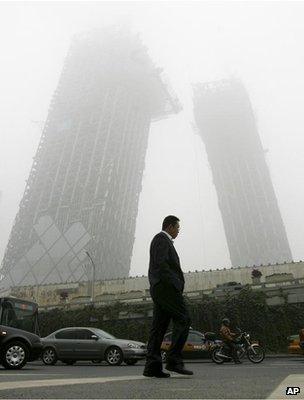Air pollution kills millions each year, says study
- Published

Outdoor air pollution is estimated to contribute to more than two-and-a-half million deaths each year, a study has suggested.
It calculated that, each year, 470,000 people died as a result of ozone and 2.1 million deaths were linked to fine particulate matter.
Air pollution increased respiratory and heart disease risks, with the young, elderly and infirm most vulnerable.
The findings appear in the Environmental Research Letters journal.
"Epidemiological studies have shown that ozone and PM2.5 (particulates with a diameter of less than 2.5 microns - about 30 times thinner than the width of a human hair) have significant influences on human health, including premature mortality," an international team of scientists wrote.
In order to reach their estimate, the researchers compared the results from a range of earlier mathematical models on deaths from air pollution.
They found that their total was lower than previous estimates.
But the team added: "Our methods likely underestimate the true burden of outdoor pollution because we have limited the evaluation to adults aged 30 and older.
"On the other hand, recent studies suggest that the relationship between PM2.5 and mortality may flatten at high concentrations, suggesting that we may overestimate PM2.5 mortality in regions with very high concentrations."
Global problem
The World Health Organization (WHO) says it is difficult to identify the world's most polluted areas because many cities with high levels of air pollution do not have monitoring systems in place.
"Nevertheless, the available data indicates that air pollution is very high in a number of Asian cities (Karachi, New Delhi, Kathmandu, Beijing), in Latin American cities (Lima, Arequipa) and in Africa (Cairo)," it observes.
But the WHO adds that although most air pollution hotspots are located in developing nations, it says that developed countries are also at risk and the issue is a major environmental risk globally.
As air quality is largely beyond the control of an individual, the WHO says action needs to be taken by national and international bodies.
In 2005, WHO published its Air Quality Guidelines that recommended limits of air pollutants, including PM2.5 and ozone.
"Continued exposure to particles contributes to the risk of developing cardiovascular and respiratory diseases, as well as lung cancer," the WHO states.
"The mortality in cities with high levels of pollution exceeds that observed in relatively cleaner cities by 15-20%," it adds.
"Even in the EU, life expectancy is 8.6 months lower [as a result of] exposure to PM2.5 produced by human activities."
Ozone pollution is linked to breathing problems, such as asthma, reduced lung function and lung disease.
Feeling the heat
The research, conducted by an international team of scientists, also looked at how changes to the planet's climate system as a result of human activities could have affected the impact of air pollution, such as changes in temperature and humidity.
While being a contributing factor to climate change, previous studies had considered how the emissions could create conditions that exacerbated poor air quality, such as the way an increased concentration of chemicals interacted with sunlight.
Another change is the way higher temperatures affect plants' biochemical characteristics.
Trees use chemicals known as volatile organic compounds (VOCs) to attract pollinators as well as deter damaging attacks from insects and larger animals.
However, higher temperatures can cause many tree species to emit more VOCs into the atmosphere, which reacts with sunlight to form ozone or more particulates.
Using a model of ozone and PM2.5 atmospheric concentrations from 1,850 and 2,000, the researchers concluded changes to the climate since pre-industrial times accounted for only a small proportion of the current deaths related to air pollution.
They calculated that about 3,700 deaths each year could be attributed to the effects of past climate change on air quality.
The team observed: "As models continue to develop and comprehensively represent the mechanisms by which climate change might influence air quality, we should expect that large estimates based on different models will likely persist."
- Published10 July 2013
- Published9 July 2013
- Published9 November 2012